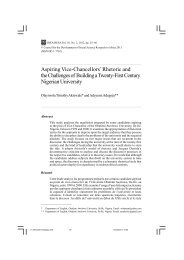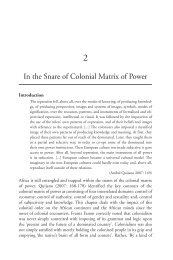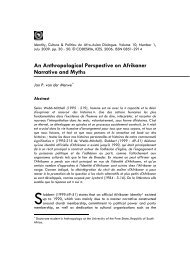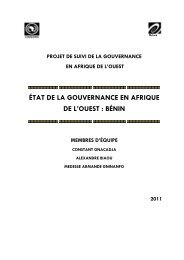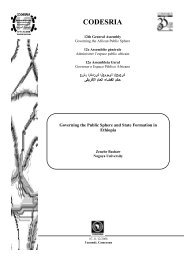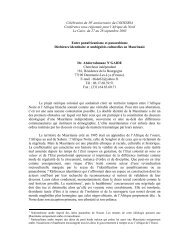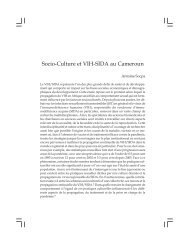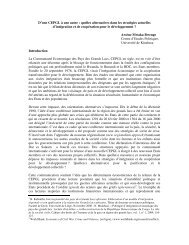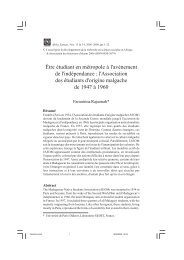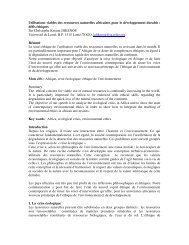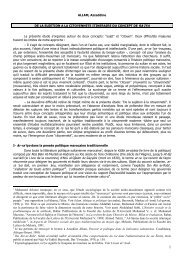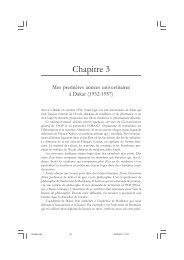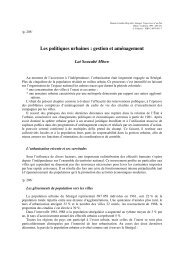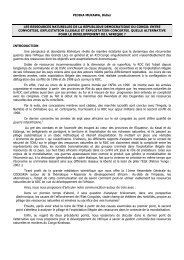Land and Agrarian Reform in Former Settler Colonial ... - codesria
Land and Agrarian Reform in Former Settler Colonial ... - codesria
Land and Agrarian Reform in Former Settler Colonial ... - codesria
You also want an ePaper? Increase the reach of your titles
YUMPU automatically turns print PDFs into web optimized ePapers that Google loves.
Murisa: Social Organisation <strong>in</strong> the Aftermath of ‘Fast Track’<br />
283<br />
<strong>L<strong>and</strong></strong> occupations <strong>in</strong>itially contributed to the emergence of new forms of<br />
popular rural authority. However, s<strong>in</strong>ce resettlement, these have gradually been<br />
replaced by the fusion of traditional <strong>and</strong> modern <strong>in</strong>stitutions which br<strong>in</strong>g<br />
together customary <strong>and</strong> popular political functionaries to serve on the same<br />
platforms. In the post-Fast Track period, there has been a shift <strong>in</strong> the form<br />
of the local state towards re-establish<strong>in</strong>g traditional structures <strong>in</strong> the Newly<br />
Resettled Areas. The manner <strong>in</strong> which the turn towards re-<strong>in</strong>stitut<strong>in</strong>g traditional<br />
authority has taken place does not augur well for local democratic practice <strong>and</strong><br />
is rem<strong>in</strong>iscent of the manner <strong>in</strong> which the colonial state imposed traditional<br />
authority structures after the l<strong>and</strong> alienations. The forms of social relations <strong>and</strong><br />
action that have emerged <strong>in</strong> Newly Resettled Areas vary, but do not necessarily<br />
confront the turn towards the re-establishment of traditional authority. Rather,<br />
they respond to weak state delivery <strong>and</strong> limited market activity.<br />
Although none of the exist<strong>in</strong>g Fast Track resettlement models provide for<br />
the creation of collective schemes, the resettled are comb<strong>in</strong><strong>in</strong>g <strong>in</strong>dividual <strong>and</strong><br />
group action <strong>in</strong> response to different social reproduction constra<strong>in</strong>ts. Local<br />
networks of cooperation have been established to complement <strong>in</strong>dividual<br />
household efforts. A variety of local networks <strong>and</strong> associational forms have<br />
been formed recently on a number of former large-scale farms <strong>and</strong> these are<br />
established <strong>in</strong> various ways, <strong>in</strong>clud<strong>in</strong>g the very <strong>in</strong>formal (with no structures)<br />
<strong>and</strong> at times <strong>in</strong>visible forms that are only activated dur<strong>in</strong>g specific periods.<br />
One of the notable outcomes of the Fast Track period has been the surge<br />
towards ‘organic’ association (<strong>in</strong> the sense that it has ma<strong>in</strong>ly been driven by the<br />
l<strong>and</strong> beneficiaries with m<strong>in</strong>imal <strong>in</strong>put from external agents) <strong>and</strong> formalised<br />
associational activity. Approximately, 25 per cent belong to the more structured<br />
associational forms <strong>and</strong> there are more who belong to unstructured networks<br />
of cooperation.<br />
Fast Track resettlement areas rema<strong>in</strong>, not only isolated from the national<br />
smallholders’ union, but also from global <strong>and</strong> national civil society compris<strong>in</strong>g<br />
a complex web of networks <strong>in</strong>volv<strong>in</strong>g local <strong>and</strong> <strong>in</strong>ternational actors such as<br />
NGOs, unions <strong>and</strong> donors. The local farmers’ groups that have emerged<br />
operate outside the parameters of this civil society. They sit uneasily <strong>in</strong> both<br />
the civil society <strong>and</strong> as subord<strong>in</strong>ate agents of the state as they help their<br />
members to undertake productive <strong>and</strong> economic activities, a role associated<br />
with the state. They rema<strong>in</strong> shunned <strong>and</strong> isolated by other civil society-based<br />
networks despite the state’s attempts to civilise the Fast Track resettlement<br />
areas by ensur<strong>in</strong>g that the l<strong>and</strong> beneficiaries are legitimate property holders.<br />
<strong>L<strong>and</strong></strong> <strong>and</strong> <strong>Agrarian</strong> <strong>Reform</strong> <strong>in</strong> <strong>Former</strong> <strong>Settler</strong> <strong>Colonial</strong> Zimbabwe.<strong>in</strong>dd 283 28/03/2013 12:57:32



